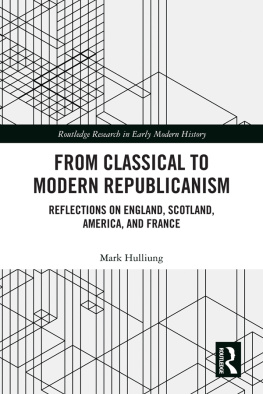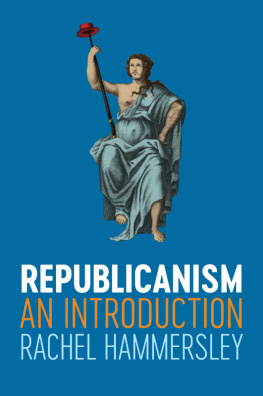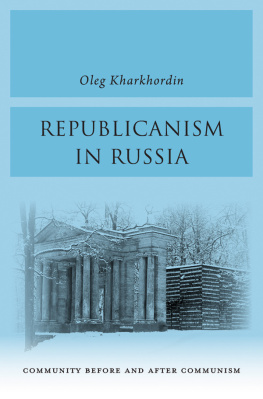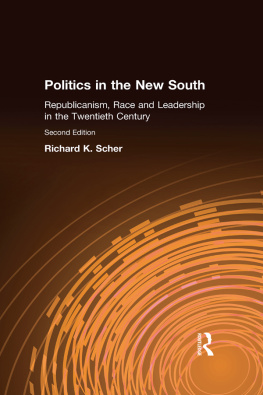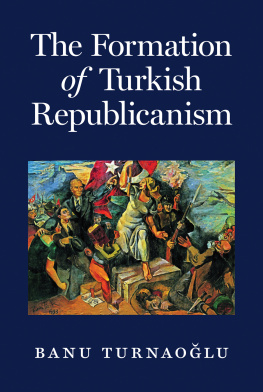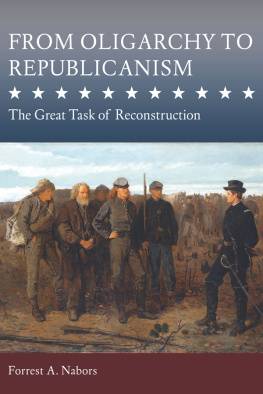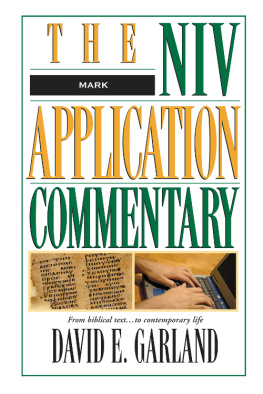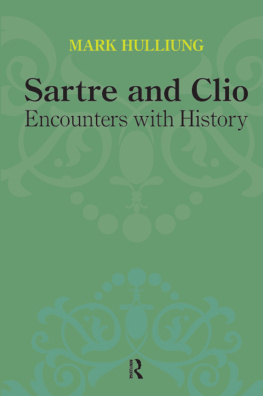Hulliung Mark - From Classical to Modern Republicanism
Here you can read online Hulliung Mark - From Classical to Modern Republicanism full text of the book (entire story) in english for free. Download pdf and epub, get meaning, cover and reviews about this ebook. year: 2020, publisher: Taylor & Francis Group, genre: Politics. Description of the work, (preface) as well as reviews are available. Best literature library LitArk.com created for fans of good reading and offers a wide selection of genres:
Romance novel
Science fiction
Adventure
Detective
Science
History
Home and family
Prose
Art
Politics
Computer
Non-fiction
Religion
Business
Children
Humor
Choose a favorite category and find really read worthwhile books. Enjoy immersion in the world of imagination, feel the emotions of the characters or learn something new for yourself, make an fascinating discovery.
- Book:From Classical to Modern Republicanism
- Author:
- Publisher:Taylor & Francis Group
- Genre:
- Year:2020
- Rating:4 / 5
- Favourites:Add to favourites
- Your mark:
- 80
- 1
- 2
- 3
- 4
- 5
From Classical to Modern Republicanism: summary, description and annotation
We offer to read an annotation, description, summary or preface (depends on what the author of the book "From Classical to Modern Republicanism" wrote himself). If you haven't found the necessary information about the book — write in the comments, we will try to find it.
From Classical to Modern Republicanism — read online for free the complete book (whole text) full work
Below is the text of the book, divided by pages. System saving the place of the last page read, allows you to conveniently read the book "From Classical to Modern Republicanism" online for free, without having to search again every time where you left off. Put a bookmark, and you can go to the page where you finished reading at any time.
Font size:
Interval:
Bookmark:
As is true of all historians, I have over the years accumulated debts to a number of scholars. To salute everyone to whom I am indebted would take far too long. Here I shall limit myself to naming only a few: Joyce Appleby, Bernard Bailyn, Keith Michael Baker, Lance Banning, Colin Bonwick, Eric Foner, Bridget Hill, Daniel Walker Howe, Lynn Hunt, Isaac Kramnick, Stephen Macedo, Pauline Maier, Drew McCoy, R. R. Palmer, Jack N. Rakove, Caroline Robbins, John Robertson, Daniel T. Rodgers, Richard Sher, Judith Shklar, Lynne E. Withey, Gordon Wood, David Wootton, and Michael Zuckert. The most recent book that I believe deserves widespread recognition is Helena Rosenblatts The Lost History of Liberalism. I wish to express my gratitude for the support I have received from the Norman Funds of Brandeis University.
Introduction
For the last several decades there has been an ongoing debate about the place of Greek and Roman republican thought in the centuries stretching from the early modern to the modern period, from the Italian Renaissance to Englands Puritan uprising, and then to the eighteenth century in Scotland, but most of all to the events and debates in America and France during the age of revolutions. The outpouring of publications addressing the supposedly prominent role of classical republicanism in modern times, mostly but not exclusively written by historians and political theorists, has been enormous. Important issues of public life in our times, not simply scholarly studies of the past, have been at stake.
In the intellectual world, no less than in the world of fashion, trends come and go; scholars move on to the next wave of contestation. It is possible but not obvious that the scholarly debate about republicanism has come to a close; even if it has, our contention is that it needs to be reopened, because the wrong interpretation has won the day. Or so we wish to suggest. Our thesis, which aims to challenge much of the established literature, is that republicanism in the modern age was distinctively modern rather than an effort to impose an ill-suited classicism upon modern times. Obviously political writers in the period of transition from early modern to modern history were well versed in classical readings, but citations here and there in their works to Livy or Cicero do not prove much if the authors aimed at little more than to embellish their presentations with displays of literary finesse.
Yet it seems that whenever scholars of our day come across a classical reference in the letters, essays, and treatises of earlier centuries, they immediately proclaim the discovery of another instance of classical republicanism rearing its head in the modern world. No sooner, for example, does accomplished historian Keith Michael Baker encounter a French figure of the late eighteenth century in whose works the classics are cited now and again than he immediately offers an interpretation in terms of classical republicanism, With little or no proof, the pattern of much scholarly research is that anything arguably republican is called classical.
Mine is not entirely a voice crying in the scholarly wilderness. A number of other historians and political theorists have questioned claims that classical republicanism is an interpretation that accurately grasps the meaning of modern writers such as James Harrington, Algernon Sidney, or Alexander Hamilton, to name only a few. The admirable contributions of Joyce Appleby, Isaac Kramnick, Daniel T. Rodgers, and Michael Zuckert immediately come to mind. And it is well worth noting that the ranks of the purveyors of the classical republican interpretation include outstanding scholars such as Lance Banning, whose works contain rich specific findings worthy of deep respect even if one disagrees with the overall interpretive framework into which they have been placed. The very publications of those who promulgate the thesis of classical republicanism are often well worth harvesting by anyone who adheres to the alternative thesis of modern republicanism ().
It is tempting to say that many scholars find classical republicanism where it does not exist and miss it where it does. A better candidate for the title of classical republican in the modern age than George Fitzhugh is difficult to imagine. Speaking as a champion of Americas slave-owning South, he wrote that we saw at once that our theory of the origin of society was identical with [Aristotles]. We saw at once that the true vindication of Developing his point of view, he made it clear that by no means did he limit his advocacy of slavery to the American South or to blacks. Fitzhugh was not satisfied until he called for white slavery in Europe and across all of America, an arrangement under which the white laboring classes, at present terribly exploited, would gain the comforts of paternalistic security.
What made it difficult to ignore Fitzhughs outrageous proposal was that spokespersons for the Northern labor movement frequently spoke figuratively of free labor as slave labor. Orestes Brownson, passionate spokesperson for workers, wrote in The Laboring Classes, We are no advocates of If only Northern labor literally were slave labor was Fitzhughs rejoinder. Workers would fare much better if they actually were slaves as in the South, their needs attended to by their owners who from self-interest as well as higher objectives would gladly attend to their well-being. Anyone familiar with classical republicanism, Fitzhugh assured his readers, should understand that the Southern states were the admirable equivalent of the ancient polis in the modern world.
Scholars craving classical republicanism have by and large overlooked Fitzhughs uncompromising endorsement of a plan for placing Aristotle at the center of modern life. They have also failed to notice that Fitzhughs feisty polemics against natural rights/social contract theory was an attack on the kind of republicanism he feared and which had existed in America from the revolutionary period and continued to exist in his day. What he hated was modern republicanism speaking the language of freedom, consent, and inalienable rights. Fitzhugh gives us ample reason to be grateful that classical republicanism failed in America and to be thankful for all those moments when the natural rights republicanism frequently neglected by todays scholars succeeded.
Why, then, has the scholarship taken a wrong turn, and how might we overcome its shortcomings? To appreciate its deficiencies, it is well to remember that historians are themselves historical beings, and we frequently fall prey to the temptation to read our present-day concerns back into the past. The initial efforts of scholars to press the agenda of a classical republican research pattern to discover in the past a paradigm of classical republicanism, to cite the inflated scholarly jargon apparently had little or nothing to do with the ideological battles of our times. Before long, however, politically preoccupied scholars set about reading their current agendas into the past, discovering a labor republicanism, for instance, in the nineteenth century that would provide a substitute for a missing socialist tradition in America; or they spied signs in the past of outlooks that would match up nicely with the outlook of the ). Historians of American society and politics, more so than historians of Europe, have been especially eager to pursue a classical republican agenda and to discover themselves, their present-day preoccupations, in the past.
Our countervailing strategy is to sustain and avail ourselves of all that is best in the existing studies of republicanism in American history, but to do so while reaching beyond the United States, engaging in examinations of three other countries: England, Scotland, and France. Looking at America from the outside as well as the inside, offering a comparative perspective, should be helpful; enlarging our studies by dwelling on four countries may provide us with new insights that examinations of America alone cannot yield. The overall picture of the republican tradition or traditions may better come to light if we can enlarge our focus to include Europe as well as America, while avoiding a presentation of excessive length. We shall pursue what for us are new studies, combined with consolidating and placing into a new focus several of our previous efforts. A synthesis rather than a lumbering study is our objective.
Font size:
Interval:
Bookmark:
Similar books «From Classical to Modern Republicanism»
Look at similar books to From Classical to Modern Republicanism. We have selected literature similar in name and meaning in the hope of providing readers with more options to find new, interesting, not yet read works.
Discussion, reviews of the book From Classical to Modern Republicanism and just readers' own opinions. Leave your comments, write what you think about the work, its meaning or the main characters. Specify what exactly you liked and what you didn't like, and why you think so.

